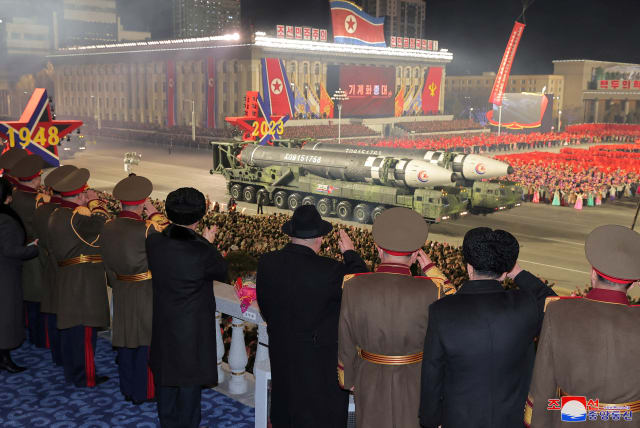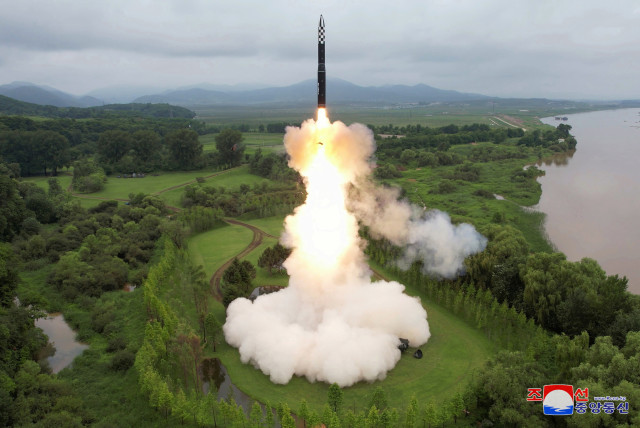In rare UN appearance, North Korea defends missile launch

The 15-member Security Council met after North Korea said it tested its latest weapon on Wednesday, and claimed the weapon is the core of its nuclear strike force.
North Korea's launch of an intercontinental ballistic missile (ICBM) was an exercise of its right to self-defense "to deter dangerous military moves of hostile forces and safeguard the security of our state," the country's UN envoy told the Security Council on Thursday during a rare appearance.
The 15-member Security Council met after North Korea said it tested on Wednesday its latest Hwasong-18 ICBM, adding the weapon is the core of its nuclear strike force.
"We categorically reject and condemn the convening of the Security Council briefing by the United States and its followers," North Korea's UN Ambassador Kim Song told the council.
North Korea last spoke at a council meeting on its nuclear and ballistic missile programs in December 2017, diplomats said.
North Korea - formally known as the Democratic People's Republic of Korea (DPRK) - has been under UN sanctions for its missile and nuclear programs since 2006. This includes a ban on the development of ballistic missiles.
In a separate statement on Friday, North Korean leader Kim Jong Un's powerful sister, Kim Yo Jong, "strongly denounced" the UN meeting as unfair and biased, blaming the United States for escalating tensions in the region.
"The price the US would have to pay for provoking us won't be light," Kim said, vowing to push for the "most overwhelming" nuclear deterrence until Washington drops what she called its hostile policy against Pyongyang.
For the past several years the council has been divided over how to deal with Pyongyang. Russia and China, veto powers along with the United States, Britain and France, have said more sanctions will not help and want such measures to be eased.
China and Russia blame joint military drills by the United States and South Korea for provoking Pyongyang, while Washington accuses Beijing and Moscow of emboldening North Korea by shielding it from more sanctions.
"Russia and China have prevented this council from speaking with one voice. And with these repeated launches, Pyongyang is demonstrating it feels emboldened," Deputy US Ambassador to the United Nations, Jeffrey DeLaurentis, told the council.
China slams NATO
DeLaurentis said the US was committed to diplomacy and "publicly and privately and at senior levels we have repeatedly urged the DPRK to engage in dialogue." He said Washington had made clear there were no preconditions for engagement and it would "discuss any topic of concern to Pyongyang."
"The DPRK has not responded to our offers," he said.
China's UN Ambassador Zhang Jun told the council that Beijing was committed to the denuclearization of the Korean Peninsula and the settlement of the issue through dialogue.
He described the situation as "tense" and said it was getting "ever more confrontational." China has "taken note" of North Korea's latest missile launch, Zhang said.
"The Cold War has long since ended, but the specter of the Cold War mentality lingers. It has not only rendered the Peninsula issue intractable, but also intensified antagonism and conflict around the world," he said.
He went on to slam a communique by NATO leaders this week, telling the council it was as "long-winded as it was harping the same old tunes filled with Cold War mentality and ideological prejudices." Zhang said NATO should do some "soul-searching."
NATO leaders in the communique said China challenged NATO's interests, security and values with its "ambitions and coercive policies."
"China does not cause trouble, nor does it fear trouble," Zhang said. "We stand ready to respond firmly and forcefully to any act that violates China's sovereignty and territorial integrity, undermine China's development and security interests and breach the peace and stability in China's neighborhood."
Jerusalem Post Store
`; document.getElementById("linkPremium").innerHTML = cont; var divWithLink = document.getElementById("premium-link"); if (divWithLink !== null && divWithLink !== 'undefined') { divWithLink.style.border = "solid 1px #cb0f3e"; divWithLink.style.textAlign = "center"; divWithLink.style.marginBottom = "15px"; divWithLink.style.marginTop = "15px"; divWithLink.style.width = "100%"; divWithLink.style.backgroundColor = "#122952"; divWithLink.style.color = "#ffffff"; divWithLink.style.lineHeight = "1.5"; } } (function (v, i) { });

